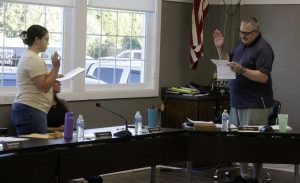Former Sweet Home School Board Chair Jason Redick and newly elected member Dustin Nichol gave the board a tongue-lashing Monday, Aug. 11, in response to an aborted attempt by some members to oust Supt. Terry Martin in late July.
In a sometimes-contentious meeting that lasted nearly three hours, board members later voted out newly elected Chairman Floyd Neuschwander, who was not present, and Secretary Mary Massey. Both remain on the School Board, but not as officers.
Mike Adams, who was vice chair when the meeting started, was voted in as the new chair 6-1, with Massey opposing the move.
Also present at the meeting were Massey, Amanda Carter, Jenna Northern, Dale Keene and Rachel Maynard. Massey said Neuschwander was at his daughter’s commissioning “on a boat somewhere.”
“He would be here if he could, but he cannot because he put his child first,” she said.
Adams, an attorney who has represented public agencies for many years, reported to the board that public complaints had been filed with the district over the past week from five individuals, naming as many as five board members who, the filers alleged, had violated state open meetings laws and board policies in seeking to fire Martin in a meeting scheduled for July 21, exactly seven days after the board’s regular July 14 meeting in which Neuschwander was elected chair in a 5-2 vote, Adams and Keene dissenting.
Adams said that complaints had been filed starting Monday, Aug. 4, with four separate complaints filed by Redick against four board members: Neuschwander and Massey, who are both two years into their four-year terms on the board, Maynard and Carter, who were elected to the board in May. Carter had not been sworn in until Monday’s meeting. Those four complaints were followed by others on Aug. 7, Aug. 9, and Aug. 11.
The complaints all targeted Neuschwander, but also suggested that the board members in question had planned to replace Martin with former Foster Principal Luke Augsburger, now a vice principal at Sweet Home High School, whose wife Chelsea Augsburger is a Sweet Home City Council member. The complaints included copies of social media messages in which board members appeared to be discussing their plans.
Redick took the mic during the public comment period, in front of a capacity crowd in the board chambers, lambasting the board for violating open meetings laws and for seeking to terminate Martin’s contract “for no cause.”
 He noted that Martin’s original contract stated that if he were to be fired for no cause, he would be paid up to three years of wages and benefits, a provision that state law has since limited to one year.
He noted that Martin’s original contract stated that if he were to be fired for no cause, he would be paid up to three years of wages and benefits, a provision that state law has since limited to one year.
“This law was not intended to be used because a few members of the board decided that they wanted to remove the superintendent and insert their friend in this position,” Redick said, adding that the new law’s intent was to protect the district from a costly pay-out.
He then moved on to remind the board that “any business of the board is to be conducted in public session only” with a few legal exemptions.
Redick, who filed five of the complaints himself, said conversation and electronic communication between board members “constituted an illegal serial board meeting” based on state law and the board’s own policy.
“This violation occurred through the board chair contacting multiple board members in order to gain support for his termination of the superintendent’s contract.”
He warned board members that they could individually face fines for participating in illegal meeting activities and if the board does not respond to the complaints, the matter would be appealed to the Oregon Government Ethics Commission.
Redick also accused Neuschwander of “potential for actual conflict of interest regarding the removal of the superintendent and the appointment of his preferred candidate to the position,” adding that Neuschwander’s goals “were in retaliation for employment actions taken against Floyd’s wife, who is an employee of the school district.”
Redick stated that he personally has had to stop Neuschwander from “trying to attack the superintendent over that issue in public meetings.
The board chair’s job, he added, is to run public meetings in a manner that keeps “these situations” from happening, that all voices of board members are heard before decisions are made. He said Neuschwander failed to do that.
“Floyd has used his position to push his personal agenda and to attempt to keep debate and the decision process out of the view of the public. He has violated not only board policy, but state law, and in the process, dragged other board members into these violations, opening up those board members to personal liability and loss of crimes,” Redick said.
“One board member who was involved in the situation has already resigned. There are others who should consider the same course of action.”
He also said he questioned why Barstad’s resignation letter to Neuschwander, dated July 28, the date that Barstad said she submitted it to Neuschwander, was not stamped as received by the district until Aug. 7, the date the agenda for Monday’s meeting was revised to include acceptance of Barstad’s resignation.
“If the board chair had received a letter of resignation, why did he sit on it through the Board Officers’ Meeting, which took place on Aug. 4, when the agenda for this meeting was set?” Redick asked. “Why was it not a part of the original agenda that was set and approved by all of the board officers? I can speculate about why this happened, but I can’t come up with one single justifiable reason for him to hold this resignation until it became public knowledge and his hand was forced.”
In addition to violations of board policy and state law, Redick blamed Neuschwander’s actions for dragging the board into controversy and disrupting the district “extremely,” with potential of costing it “hundreds of thousands of dollars that should be used to educate the students,” as well as breaking trust and creating “unnecessary anger at the board for his own benefit.”
He warned that dysfunction at the top of the district would work its way down into the classrooms and suggested that board members who participated in illegal activity should consider resigning.
 Adams told board members that, after conversations with Oregon School Board Association attorneys and Oregon Government Ethics Commission personnel, he believed board members had three choices in deciding how to respond to the complaints filed with the district.
Adams told board members that, after conversations with Oregon School Board Association attorneys and Oregon Government Ethics Commission personnel, he believed board members had three choices in deciding how to respond to the complaints filed with the district.
He noted that they had 21 days from when the first complaint was filed, on Aug. 4, to respond to the complaints. He said the timing of the filings, during the week before the meeting, prompted him to hold off on distributing the complaints to board members to avoid the appearance of impropriety – a serial meeting, he said. Those filings, he said, were the first step toward filing a grievance with the OGEC.
“This process is kind of what gets you through the gate, through the door,” he explained.
Adams said they had three options:
(1) Deny that they did anything wrong;
(2) Admit the facts, but deny the violation – essentially explaining away any appearance of wrongdoing; or
(3) Admit the facts and the violation and explain how they were going to fix the situation.
He acknowledged that time was too short to hire an investigator to look into the situation.
Nichol said he’d tried to do some research on his own in preparation for the scheduled July 21 meeting, since he’d only met Martin briefly, once.
He said he’d talked to 62 people from a wide range of the local population over the weekend before he anticipated participating in the July 21 meeting, and only two had told him they wanted Martin gone. He said he got “educated” about board policies and messaging in those conversations.
Also, he said, he spent “quite a bit of time” talking with state officials about serial meetings.
“All this stuff came down the pike and this is all before we could even get into school,” Nichol said.
“We don’t make widgets in the Sweet Home,” he said. “Our products are human beings.
“For people to come onto this board and act the way you’re acting at the expense of the kids, to take their personalized, individualized, and selfish agendas to this board is insulting, in my opinion.”
After extensive discussion of various options, board members agreed with a motion posed by Nichol to go around the table and have each member opt for the first option – deny any wrongdoing, or the third – admit the facts and explain how they planned to remedy the situation.
Carter, Northern, Admas, Keene, Maynard and Nichol all picked Option 3, while Massey picked the first option.
They then voted 6-1, with Massey in opposition, to select Adams as chair.
The board then voted unanimously to support a motion by Keene to have Adams craft a response to OGEC stating that they had removed and replaced the board chair and the other officer named in the complaint (Massey) and that they would seek remedial training from OSBA and defer to the Ethics Commission.
They agreed that they would fill the other board officer vacancies – the secretary position and Adams’ former vice chair position – at their next meeting.
– A YouTube recording of the board meeting can be viewed online at www.youtube.com/watch?v=X50txXW9qxc.





